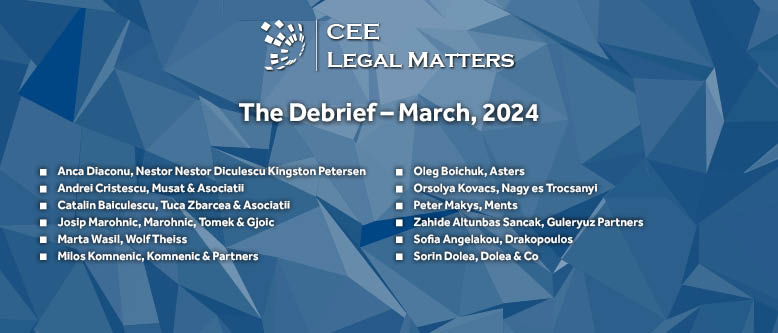Contributed by Drakopoulos.
The Debrief: June, 2024
In The Debrief, our Practice Leaders across CEE share updates on recent and upcoming legislation, consider the impact of recent court decisions, showcase landmark projects, and keep our readers apprised of the latest developments impacting their respective practice areas.
Drakopoulos Advises UEFA on Brand Enforcement
Drakopoulos has advised the Union of European Football Associations on a brand enforcement project in relation to the UEFA Europa Conference League Final, held on May 29 in Athens, Greece.
The Debrief: May, 2024
In The Debrief, our Practice Leaders across CEE share updates on recent and upcoming legislation, consider the impact of recent court decisions, showcase landmark projects, and keep our readers apprised of the latest developments impacting their respective practice areas.
The Debrief: April 2024
In The Debrief, our Practice Leaders across CEE share updates on recent and upcoming legislation, consider the impact of recent court decisions, showcase landmark projects, and keep our readers apprised of the latest developments impacting their respective practice areas.
The Debrief: March 2024
In The Debrief, our Practice Leaders across CEE share updates on recent and upcoming legislation, consider the impact of recent court decisions, showcase landmark projects, and keep our readers apprised of the latest developments impacting their respective practice areas.
Drakopoulos Joins South East Legal Alliance
Drakopoulos has become a part of the South East Legal Alliance, thus expanding the network’s reach to Athens, Bucharest, and Nicosia.
The Corner Office: Budget, Budget, Budget
In The Corner Office, we ask Managing Partners at law firms across Central and Eastern Europe about their backgrounds, strategies, and responsibilities. With 2023 marching to an end, we looked ahead and asked about strategies for next year: As the budgeting period is around the corner, compared to 2023, what are the main budgeting lines you expect to increase for 2024 and why?
CEELM10 Roundtable: A Decade of M&A in CEE
On November 21, 2023, corporate/M&A and private equity experts from Bulgaria, Greece, Hungary, Kosovo, Moldova, Romania, Serbia, Slovakia, Turkiye, and Ukraine sat down for a virtual round table moderated by CEE Legal Matters Managing Editor Radu Cotarcea to discuss the key developments in the field over the past decade.
CEELM10 Interview: A Decade of M&A in Greece
Drakopoulos Managing Partner Panagiotis Drakopoulos talks about the evolution of the practice and their role as legal advisors in Greece over the last 10 years.
Greece: The Hellenic Data Protection Authority’s Case Law on Telecommunications Providers
In the digital era, the protection of personal data has become a critical concern. Governments and regulatory bodies worldwide are actively working to ensure that individuals’ privacy rights are upheld and telecommunications providers play a significant role in this landscape. In this context, a brief review of the Hellenic Data Protection Authority’s (HDPA) case law concerning telecommunications providers in Greece over the past 12 months would lead to invaluable insights into the evolving respective legal landscape and the challenges faced by both organizations and individuals in safeguarding personal data.
Know Your Lawyer: Mika Lalaouni of Drakopoulos
An in-depth look at Mika Lalaouni of Drakopoulos covering her career path, education, and top projects as a lawyer as well as a few insights about her as a manager at work and as a person outside the office.
The Corner Office: The Next Booming Practice
In The Corner Office, we ask Managing Partners at law firms across Central and Eastern Europe about their backgrounds, strategies, and responsibilities. With the first quarter of 2023 wrapped up, we turned to the future and asked: In which practice area do you expect the most growth – in terms of work volume – in the next 12 months?
Greece: Real Estate Investment Companies
The real estate market in Greece has risen the most in the last years, creating attractive incentives for institutional investors, who are constantly seeking optimal investment structures to implement their large-scale real estate projects. A highly popular investment vehicle among seasoned real estate players has been the Real Estate Investment Company (REIC), which promises investors financial benefits and a more stable and favorable tax regime.
The Corner Office: Workforce Ebb and Flow
In The Corner Office, we ask Managing Partners at law firms across Central and Eastern Europe about their backgrounds, strategies, and responsibilities. Keeping in mind last year’s complexities and the uncertainties ahead, this time we asked: Has your team shrunk or increased in the last 12 months and what are your expectations for 2023?
Electronic Signatures, Contracts, and Archiving in Greece
Contributed by Drakopoulos.
Expert Summit Round Table: Considering an Inconsistent and Threatened Recovery in CEE Legal Markets
On the evening of December 8, 2016, at the Hotel Bristol in Warsaw, CEE Legal Matters hosted the 2016 Expert Summit – our annual gathering of experts from across the region to discuss the state of affairs in CEE Legal Markets.
Meeting of Minds: The 2015 CEE Legal Matters Expert Summit
On the evening of December 10, 2015, experts from law firms across the region gathered in Prague for an exclusive and select invitation-only Round Table conversation on business and political realities across CEE, the changing nature of CEE legal markets and increased visibility of regional law firms, and much more.



















